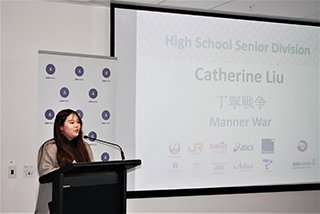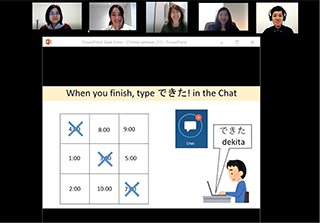Historical Events and Trying New Things at The Japan Foundation, Sydney
The Japan Foundation, Sydney
SAITO Mami, HIRAKAWA Shunsuke, and KADOI Minako
Celebrating Both Vertical and Horizontal Connections! The 50th Australian Japanese Language Speech Contest
What do you think is the significance of a Japanese-language speech contest?
The Japan Foundation, Sydney (hereinafter "JFSY"), in collaboration with the Embassy of Japan in Australia holds the Australian Japanese Language Speech Contest every year in October. This competition gathers together the winners from the High School Senior (11th and 12th grade students) Division and from the Open Division in each of Australia's states and territories as well as the winners from the High School Senior Division from the New Zealand competition.
FY2020 was the 50th anniversary of the Australian Japanese Language Speech Contest, which was very exciting, and in this report, we will tell you about it!
For this year's contest we held a special 50th anniversary reception on the eve of the tournament, with people involved in Australia's Japanese-language education, contest sponsors, and past contestants gathering together to look back on the 50-year history of the contest from 1969.
Past contestants talked about their mental attitude when they participated in the contest, discussed their own journey in learning the Japanese language, and gave words of encouragement to students who are learning the Japanese language right now. People at the venue also expressed their joy that so many past contestants are still somehow involved with Japan. It was a valuable place for people involved with the "Japanese language" in Australia to gather together and to passionately talk and interact with each other about Japanese-language learning.
And then, there was the day of the contest! At the venue, there were approximately 85 spectators and online there were 290 viewers on the livestream broadcast that watched the speeches of the contestants. The competition had three-minute speeches for the High School Senior Division and five-minute speeches for the Open Division, and the contestants enthusiastically expressed their feelings according to original themes that they chose, such as "Manner War" and "The Iroha Song and Optimistic Nihilism."
For the Japanese-language learners who participated in this contest, what kind of place did they feel it was?
There were a variety of opinions, such as that the contest was a place to reconsider and convey what you want to convey, a place to experience the process of refining your own Japanese-language abilities, a place to showcase the results of your Japanese-language studies, a place to gain confidence, and a place to encounter new friends who are similarly interested in the Japanese language and Japanese culture.
The Japanese language speech contest here in Australia can be a place for people to try out the Japanese that they have learned, a place to convey the thoughts that they have on a daily basis, and a place to encounter friends who will stimulate each other in learning the Japanese language, even after the competition.
Although the 50th anniversary of the Australian Japanese Language Speech Contest has ended, it is one of the events that we would like to see continued in order to even further liven up Japanese-language education in Australia and to continue creating connections between people.

Participant at the Australian Japanese Language Speech Contest
We Will Support You! Online Japanese-Language Classes
Due to the impacts of COVID-19, many schools in various parts of Australia adopted study-at-home measures from the end of March 2020 and remote learning continued until about the end of May. Japanese-language classes were no exception to this "emergency situation," and teachers at schools were quite busy with preparations for online learning.
The JFSY held online seminars to support Japanese-language teachers who were struggling with the online classes that they suddenly had to teach. These seminars, entitled "Tips For A Fun And Effective Online Japanese Classroom," covered two topics. In the first topic, "Enjoy Japanese Lessons Using ZOOM," we had the teachers learn basic usages and applications of the video conferencing system while experiencing it, and, additionally, we also considered the benefits and points to keep in mind for online learning in general, as well as theories and practical examples that increase student motivation. For the second topic, "Using Resources Effectively for Online Teaching," we held activities experiences to make online Japanese-language learning effective. With the keywords of "Engaging," "Interactive," "Stimulating," and "Enjoyable," we introduced ideas that students can interactively and enjoyably learn while taking advantage of the online environment, such as things that can be learned in a short period of 10–15 minutes, practices that many students can participate in simultaneously, and activities that let students learn the Japanese language by using their bodies.
There was only an extremely short preparation period of approximately three weeks from planning to implementation, but when we opened the sessions, each time we had 60 to 80 participants, and across all four sessions we have a total of 269 people who participated. In addition to participants from Australia and New Zealand, there were also participants from outside the Oceania region, such as from India, Thailand, and the Philippines.
Based on the results of an OECD survey, Australia exceeds the world average in the number of hours that ICT equipment is used in school education. From 2018, laptops have been provided for free to all public secondary school students (7th to 12th grade students) in the capital city of Canberra, and, according to a survey of public schools in Victoria state as of 2019, primary schools (1st to 6th grade students) have 1.22 students per computer and secondary schools have 0.93 students per computer, thereby showing an environment wherein all students can access a computer, and it can be said that the schools are becoming more and more ICT-enabled. However, through these sessions, we felt that the ICT situation is by no means uniform, such as the ICT facilities and environment differing depending on the institution, teachers having varying ICT literacy, and some states and schools not allowing the use of certain educational tools. Australia has a large land area and each state/territory is very unique, so this made us once again realize that, in order to reach even more schools with our support, it is important to not only collect information, but also provide ideas that are in line with the circumstances at each school.
The activities introduced in the online seminars that we described above can be downloaded for free from Classroom Resources, a JFSY-operated site that introduces teaching materials, so please check them out!

Online seminar
- What We Do Top
- Arts and Cultural Exchange [Culture]
- Japanese-Language Education Overseas [Language]
- Japanese-Language Education Overseas [Language] Top
- Learn Japanese-language
- Teach Japanese-language
- Take Japanese-Language Test
- Know about Japanese-language education abroad
- The Japanese-Language Institute, Urawa
- The Japanese-Language Institute, Kansai
- Japanese-Language Programs for Foreign Specified Skilled Worker Candidates
- Japanese Language Education for Japanese Children Resident Overseas and for the Descendants of Migrants
- Archives
- Japanese Studies and Global Partnerships [Dialogue]
- JF digital collection
- Other Programs / Programs to Commemorate Exchange Year
- Awards and Prizes
- Publications
